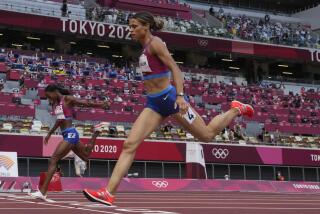High jumper Chaunte Howard Lowe has raised the bar on her career
She was doing a final workout in Atlanta before leaving for three meets in Europe last month, and high jumper Chaunte Howard Lowe decided to do some block starts, just for fun.
“Nothing serious; I’m not that fast,” said Lowe, once a sprinter-hurdler, setting up her punch line: “I’ve heard some shot-putters also do the high jump for fun.”
That is the sort of whimsical good humor everyone expects Lowe to exude. So imagine the surprise on the Georgia Tech track that day when Howard settled into the blocks and suddenly yelled, “I’m tired of losing!”
Howard, the leading U.S. women’s high jumper since 2005, was venting her frustration over having spent more than two seasons of trying to win a significant international meet. That streak had continued in early May at Doha, Qatar, where she jumped as high as reigning world champion Blanka Vlasic of Croatia but lost on fewer misses in the Diamond League’s inaugural meet.
The frustration ended soon after that practice in Atlanta.
Not only would Lowe beat Vlasic for the first time in their then 22 meetings since the Croat became the world’s dominant jumper in 2007, she went on three days later to topple a barrier that had thwarted her countrywomen for 22 years: Louise Ritter’s national record of 6 feet, 8 inches, set three months before a 1988 Olympic triumph that made Ritter the only U.S. woman to win an Olympic or world high jump title since 1956.
On a rain-slicked track May 30 in Cottbus, Germany, Lowe first matched her 4-year-old personal best of 6-7, then improved it to 6-8, then finished with the record jump of 6-8¼.
“It’s definitely a breakthrough,” Lowe said. “I knew every year the potential was there. I was jumping 6-7 in practice, and it was frustrating to jump less than that in meets.”
It became just as significant that Lowe cleared 6-7 and 6-8 in her next two Diamond League meets, even if she lost both to Vlasic on fewer misses.
“It lets you know, ‘I’m on the same playing field’ as Vlasic,” said Lowe’s coach, Nat Page, two-time state high jump champion for Evanston High School. “It says, ‘I still may have to be very good to beat her, but so does she to beat me.’ ”
Lowe, 26, should face no such challenger in her quest for a third straight high jump title at the national meet that begins Thursday in Des Moines, since none of the other entrants has topped 6-4¼.
So, in this season with no international championship meet for U.S. athletes, Lowe has taken on a challenge, the long jump, in which the personal best of 21-8¼ she recorded in May ranks sixth among U.S. women this season.
Of course, that’s not bad for someone who hadn’t long jumped since finishing second in the event at the 2005 Atlantic Coast Conference Championships.
“I like the high jump better,” Lowe said. “It feels like my gift and my craft. The high jump is more thinking and technique and work. The long jump is unknown and excitement: run, jump, fun.”
Lowe, a two-time national scholastic high jump champion at J.W. North High School in Riverside, isn’t one to shy from challenges.
She and her husband of five years, Mario Lowe, had a child, Jasmine, less than 11 months before the 2008 U.S. Olympic Trials, which she won en route to a sixth-place finish in Beijing.
While looking toward the 2012 Olympics in London, where the high jump is the only event she intends to try, Lowe also has decided to put her Georgia Tech economics degree to use by getting a teaching certificate so she can become a high school math and science teacher.
“I haven’t got it all figured out yet,” she said. “I’m still not finished with my work in track and field.”
Lowe got off to a fast start in that career. A month after winning the NCAA high jump title as a sophomore, she made the 2004 Olympic team. In 2005, she finished second at the outdoor world championships, best ever for a U.S. woman at that meet.
Those performances were surprising to everyone but Lowe and her coach. Both knew what might happen if she concentrated on one event rather than the five, plus relays, she routinely did in college.
For all that early success, it still took Lowe most of the next five years to learn how to compete at her best.
Lowe found strength and the ability to relax in what she describes as a “more personal relationship with God.” And she stopped sapping her strength by abandoning a diet that previously counted “anything with sugar as an eight-course meal.”
Now she feasts on results. How sweet they are.
More to Read
Go beyond the scoreboard
Get the latest on L.A.'s teams in the daily Sports Report newsletter.
You may occasionally receive promotional content from the Los Angeles Times.




